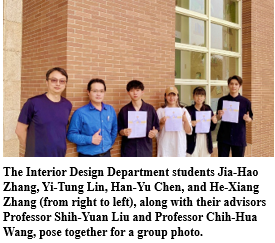The Department of Interior Design at Asia University Sets a New Record, Clinching Global First Place and the Best Annual Interior Design Award from the London International Creative Competition (LICC) in 2023
Student Chiao-Hui Yu's Work Wins the Grand Prize; Four Other Students Receive Interior Design Excellence Awards for Four Pieces of Work, with One Student Receiving an Honorable Mention Award, Totaling 6 Awards!
In a remarkable feat, the Asia University’s Interior Design Department has distinguished itself in the latest announcement of the prestigious global creative design awards, the "2023 London International Creative Competition" (LICC)! Chiao-Hui Yu's piece, "Hemerocallis," secured the top spot globally, winning the Best Annual Interior Design Award for 2023, setting a new record for the department in winning the largest award from LICC. Four other students received Interior Design Excellence Awards for four pieces of work, while one student received an Honorable Mention Award, totaling six major awards.
 Chair of the Interior Design Department, Dr. Sheng-cheng Shih, observed that LICC was established by the renowned Farmani Group's artists Launa Bacon and Hossein Farmani. Since its inception in 2006, LICC has been rewarding outstanding talent in the arts worldwide, attracting designers from over 65 countries annually to participate in this globally significant competition. Six students from the department stood out in this fiercely competitive global event, initially earning five "Winners" awards in the interior design category. Following rigorous evaluation by the jury, Chiao-Hui Yu's piece, "Hemerocallis," emerged victorious, securing the coveted title of the best achievement of the year globally. In addition to substantial cash prizes and trophies, this recognition offers exposure on the LICC official website, allowing her masterpiece to be seen worldwide, which is truly rare. The department continues to support and encourage students to participate in international competitions, enabling them to view design from a broader and higher perspective, ascend to the world stage, and become international interior designers.
Chair of the Interior Design Department, Dr. Sheng-cheng Shih, observed that LICC was established by the renowned Farmani Group's artists Launa Bacon and Hossein Farmani. Since its inception in 2006, LICC has been rewarding outstanding talent in the arts worldwide, attracting designers from over 65 countries annually to participate in this globally significant competition. Six students from the department stood out in this fiercely competitive global event, initially earning five "Winners" awards in the interior design category. Following rigorous evaluation by the jury, Chiao-Hui Yu's piece, "Hemerocallis," emerged victorious, securing the coveted title of the best achievement of the year globally. In addition to substantial cash prizes and trophies, this recognition offers exposure on the LICC official website, allowing her masterpiece to be seen worldwide, which is truly rare. The department continues to support and encourage students to participate in international competitions, enabling them to view design from a broader and higher perspective, ascend to the world stage, and become international interior designers.
Chiao-Hui Yu explained that the design concept of her award-winning piece, "Hemerocallis," revolves around the interior space of a clinic shared by the owner and three cats. The angularity of the space is softened and repeatedly layered to transform single arcs into smooth curves, extending the design technique to the spatial facade. This allows customers to experience the design ingenuity of curves in the indoor space, reducing the tension typically associated with clinics for both humans and pets, and creating many distinctive spaces.
Furthermore, "Floating Light" by Jia-Hao Zhang, "As Time Goes By" by Han-Yu Chen, "Celsius" by Yi-Tung Lin, and "Aim for Zero" by He-Xiang Zhang, received Interior Design Excellence Awards from LICC. "Keep Moving Forward" by Kuan-Hao Lai received an Honorable Mention Award in the interior design category.
Jia-Hao Zhang explained that his piece, "Floating Light," was developed to present a space offering watch sales, watch repair services, watch creative art exhibitions, and watch assembly experiences. Upon entering, customers can not only purchase products but also experience and appreciate art. A new interior spatial design is createdthrough the manipulation, combination, interweaving, and complementing of spatial volumes.
Han-Yu Chen stated that her piece, "As Time Goes By," showcases the rich and diverse resources of western Taiwan. However, besides traditional cuisine, culture, history, customs, pottery, and woodcarving, there is a lack of comprehensive urban planning, iconic buildings, and distinctive leisure spots, necessitating a catalyst for design change. Therefore, she began with the concept of mountains, rivers, and hills, creating a unique space that is interactive for all ages. The design incorporates green energy design techniques, expressed through architectural height differences, vertical water flow power generation, and light-guiding system design.
 Yi-Tung Lin's piece, "Celsius," is inspired by the old warehouse form of the Taichung Cultural and Creative Industrial Park, combined with the Dongguang Boulevard bicycle path, resulting in the a circular restructuring of the design form's outline. Greenery is introduced into the interior space, producing an integration of the interior and exterior through blended lines. Using photography and painting, each moment's temperature is recorded, infusing the interior space with a new vitality.
Yi-Tung Lin's piece, "Celsius," is inspired by the old warehouse form of the Taichung Cultural and Creative Industrial Park, combined with the Dongguang Boulevard bicycle path, resulting in the a circular restructuring of the design form's outline. Greenery is introduced into the interior space, producing an integration of the interior and exterior through blended lines. Using photography and painting, each moment's temperature is recorded, infusing the interior space with a new vitality.
He-Xiang Zhang explained that his piece, "Aim for Zero," aims to initiate change starting from the most common living human environment. Considering sunlight, air, and water, he explored how to use these resources to improve environmental changes, ultimately achieving a better sustainable cycle, maximizing the efficiency of these three elements. The design objective is to create a sustainable building with self-circulation, achieving sustainable development through passive design techniques, from human-age spaces to the concept of sustainable circulation in economics and architectural materials.
Design instructors Shih-Yuan Liu and Chih-Hua Wang noted that the winning students' pieces were completed during the third-year interior design course teaching process. By combining interior design concepts with sustainable creative thinking and intelligent applications, they transformed design concepts into realized designs. From the works, one can see the students' design growth and transformation. They continue to encourage students to participate in international competitions, stimulating continuous innovation and creativity, and showcasing outstanding works that grasp global trends.
In a remarkable feat, the Asia University’s Interior Design Department has distinguished itself in the latest announcement of the prestigious global creative design awards, the "2023 London International Creative Competition" (LICC)! Chiao-Hui Yu's piece, "Hemerocallis," secured the top spot globally, winning the Best Annual Interior Design Award for 2023, setting a new record for the department in winning the largest award from LICC. Four other students received Interior Design Excellence Awards for four pieces of work, while one student received an Honorable Mention Award, totaling six major awards.
 Chair of the Interior Design Department, Dr. Sheng-cheng Shih, observed that LICC was established by the renowned Farmani Group's artists Launa Bacon and Hossein Farmani. Since its inception in 2006, LICC has been rewarding outstanding talent in the arts worldwide, attracting designers from over 65 countries annually to participate in this globally significant competition. Six students from the department stood out in this fiercely competitive global event, initially earning five "Winners" awards in the interior design category. Following rigorous evaluation by the jury, Chiao-Hui Yu's piece, "Hemerocallis," emerged victorious, securing the coveted title of the best achievement of the year globally. In addition to substantial cash prizes and trophies, this recognition offers exposure on the LICC official website, allowing her masterpiece to be seen worldwide, which is truly rare. The department continues to support and encourage students to participate in international competitions, enabling them to view design from a broader and higher perspective, ascend to the world stage, and become international interior designers.
Chair of the Interior Design Department, Dr. Sheng-cheng Shih, observed that LICC was established by the renowned Farmani Group's artists Launa Bacon and Hossein Farmani. Since its inception in 2006, LICC has been rewarding outstanding talent in the arts worldwide, attracting designers from over 65 countries annually to participate in this globally significant competition. Six students from the department stood out in this fiercely competitive global event, initially earning five "Winners" awards in the interior design category. Following rigorous evaluation by the jury, Chiao-Hui Yu's piece, "Hemerocallis," emerged victorious, securing the coveted title of the best achievement of the year globally. In addition to substantial cash prizes and trophies, this recognition offers exposure on the LICC official website, allowing her masterpiece to be seen worldwide, which is truly rare. The department continues to support and encourage students to participate in international competitions, enabling them to view design from a broader and higher perspective, ascend to the world stage, and become international interior designers.Chiao-Hui Yu explained that the design concept of her award-winning piece, "Hemerocallis," revolves around the interior space of a clinic shared by the owner and three cats. The angularity of the space is softened and repeatedly layered to transform single arcs into smooth curves, extending the design technique to the spatial facade. This allows customers to experience the design ingenuity of curves in the indoor space, reducing the tension typically associated with clinics for both humans and pets, and creating many distinctive spaces.
Furthermore, "Floating Light" by Jia-Hao Zhang, "As Time Goes By" by Han-Yu Chen, "Celsius" by Yi-Tung Lin, and "Aim for Zero" by He-Xiang Zhang, received Interior Design Excellence Awards from LICC. "Keep Moving Forward" by Kuan-Hao Lai received an Honorable Mention Award in the interior design category.
Jia-Hao Zhang explained that his piece, "Floating Light," was developed to present a space offering watch sales, watch repair services, watch creative art exhibitions, and watch assembly experiences. Upon entering, customers can not only purchase products but also experience and appreciate art. A new interior spatial design is createdthrough the manipulation, combination, interweaving, and complementing of spatial volumes.
Han-Yu Chen stated that her piece, "As Time Goes By," showcases the rich and diverse resources of western Taiwan. However, besides traditional cuisine, culture, history, customs, pottery, and woodcarving, there is a lack of comprehensive urban planning, iconic buildings, and distinctive leisure spots, necessitating a catalyst for design change. Therefore, she began with the concept of mountains, rivers, and hills, creating a unique space that is interactive for all ages. The design incorporates green energy design techniques, expressed through architectural height differences, vertical water flow power generation, and light-guiding system design.
 Yi-Tung Lin's piece, "Celsius," is inspired by the old warehouse form of the Taichung Cultural and Creative Industrial Park, combined with the Dongguang Boulevard bicycle path, resulting in the a circular restructuring of the design form's outline. Greenery is introduced into the interior space, producing an integration of the interior and exterior through blended lines. Using photography and painting, each moment's temperature is recorded, infusing the interior space with a new vitality.
Yi-Tung Lin's piece, "Celsius," is inspired by the old warehouse form of the Taichung Cultural and Creative Industrial Park, combined with the Dongguang Boulevard bicycle path, resulting in the a circular restructuring of the design form's outline. Greenery is introduced into the interior space, producing an integration of the interior and exterior through blended lines. Using photography and painting, each moment's temperature is recorded, infusing the interior space with a new vitality.He-Xiang Zhang explained that his piece, "Aim for Zero," aims to initiate change starting from the most common living human environment. Considering sunlight, air, and water, he explored how to use these resources to improve environmental changes, ultimately achieving a better sustainable cycle, maximizing the efficiency of these three elements. The design objective is to create a sustainable building with self-circulation, achieving sustainable development through passive design techniques, from human-age spaces to the concept of sustainable circulation in economics and architectural materials.
Design instructors Shih-Yuan Liu and Chih-Hua Wang noted that the winning students' pieces were completed during the third-year interior design course teaching process. By combining interior design concepts with sustainable creative thinking and intelligent applications, they transformed design concepts into realized designs. From the works, one can see the students' design growth and transformation. They continue to encourage students to participate in international competitions, stimulating continuous innovation and creativity, and showcasing outstanding works that grasp global trends.



